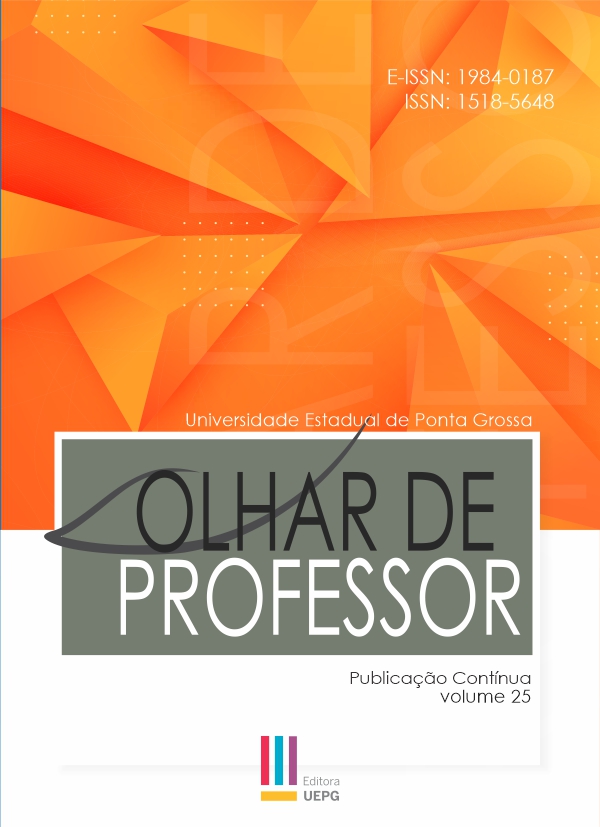Social representations: educational management and pedagogical practices in the perspective of school managers in the municipality of Uberaba-MG
Main Article Content
Abstract
The interest in researching “educational management and pedagogical practices”, assumes that the role of the manager represents an important educational activity. Thus, the problem is: how do managers think, characterize and enable the conditions for carrying out pedagogical practices in the schools in which they work? With a quanti-qualitative nature, with the subsidy of the Social Representations theory of Moscovici, this research aimed to understand the SR of Basic Education public school managers, about the pedagogical practices carried out by their teachers. 41 managers from 20 municipal and state schools participated. Data were collected through a questionnaire and the free word association technique, treated by the EVOC software. The results show that the SR of the participants about the pedagogical practices developed by their teachers are familiarized with elements that relate to a practice understood as an action that transforms and modifies the school context, but which necessarily needs to be innovative.
Downloads
Article Details

This work is licensed under a Creative Commons Attribution 4.0 International License.
Authors who publish in this journal agree with the following terms:
a) Authors keep the copyrights and concede the right of its first publication to the magazine. The work piece must be simultaneously licensed on the Creative Commons Attribution License which allows the paper sharing, and preserves both the author identity and the right of first publication to this magazine.
b) Authors are authorized to assume additional contracts separately, to not-exclusively distribution of the paper version published in this magazine (e.g.: publish in institutional repository or as a book chapter), with the author identity recognition and its first publication in this magazine.
c) Authors are permitted and stimulated to publish and distribute their papers online (e.g.: in institutional repository or on their personal webpage), considering it can generate productive alterations, as well as increase the impact and the quotations of the published paper.
d) This journal provides public access to all its content, as this allows a greater visibility and reach of published articles and reviews. For more information on this approach, visit the Public Knowledge Project, a project that developed this system to improve the academic and public quality of the research, distributing OJS as well as other software to support the publication system of public access to academic sources.
e) The names and e-mail addresses on this site will be used exclusively for the purposes of the journal and are not available for other purposes.

This work is licensed under a Creative Commons Attribution 4.0 International License.
References
ABREU, M. C. O professor universitário em aula: prática e princípios teóricos. 8 ed. São Paulo: MG Editores Associados, 1990.
ABRIC, J. C. A abordagem estrutural das representações sociais. Tradução Pedro H. Faria Campos. In: MOREIRA, A. S. P.; OLIVEIRA, D. C. de. Estudos interdisciplinares de representação social. 2. ed. Goiânia: Ab, 2000. p. 27-46.
ABRIC, J. C. Abordagem estrutural das representações sociais: desenvolvimentos recentes. In: CAMPOS, P. H. F.; LOUREIRO, M. C.S. (org.). Representações sociais e práticas educativas. Goiânia: UCG, 2003. p. 37-57.
AGUIAR, M. A. S. Gestão da educação e a formação do profissional da educação no Brasil. In: PEREIRA, N. S. C., AGUIAR, M. A. S. Gestão da educação: impasses, perspectivas e compromissos. 7. ed. São Paulo: Cortez, 2009. p.193-240.
ARRUDA, A. Teoria das representações sociais e teorias de gênero. Cadernos de Pesquisa, n. 117, nov. 2002. Disponível em: https://www.scielo.br/j/cp/a/T4NRbmqpmw7ky3sWhc7NYVb/?format=pdf&lang=pt. Acesso em: 18 de dez/2022.
BRASIL. Lei de Diretrizes e Bases da Educação Nº 9.394/96. Estabelece as diretrizes e bases da educação nacional. Diário Oficial da República Federativa do Brasil, Brasília, DF, n.248, 23 dez. 1996. Disponível em: http://portal.mec.gov.br/seesp/arquivos/pdf/lei9394_ldbn1.pdf. Acesso em: 18 de dez/2022.
BRASIL. Ministério da Educação. Secretaria de Educação Média e Tecnológica. Parâmetros Curriculares Nacionais do Ensino Médio. Ciências Humanas e suas Tecnologias. Brasília: Ministério da Educação, 1998. Disponível em: http://portal.mec.gov.br/seb/arquivos/pdf/blegais.pdf. Acesso em 18 de dez/2022
CURY, C. R. J. Formação em política e administração da educação no Brasil. In: Congresso Luso-Brasileiro de Política e Administração da Educação, 2., 2001, Braga/PT. Palestra [...]. Braga/PT: Universidade do Minho, 2001.
GIL, A. C. Metodologia do ensino superior. 3. ed. São Paulo: Atlas, 1997. 121 p.
GRAY, D. E. Pesquisa no Mundo Real. 2. ed. Porto Alegre: Penso, 2012.
HADJI, C. Avaliação Desmistificada. Tradução Patrícia C. Ramos. Porto Alegre: Artmed, 2001.
JODELET, D. Représentations sociales: un domaine en expansion. In: JODELET, D. (ed.) Les représentations sociales. Paris: PUF, 1989, p. 31-61. Tradução Tarso Bonilha Mazzotti. UFRJ- Faculdade de Educação, dez. 1993. Disponível em: http://portal.estacio.br/media/3432753/jodelet-drs-um-dominio-em-expansao.pdf. Acesso em: 20 jan. 2016.
JODELET, D. Representações sociais um domínio em expansão. As representações sociais no campo da educação. In: JODELET, D. (org.). As representações sociais. Rio de Janeiro: EDUERJ, 2001. p. 17-44.
LÜCK, H. Dimensões de gestão escolar e suas competências. Curitiba: Positivo, 2009.
LUCKESI, C. C. Avaliação da aprendizagem escolar. São Paulo: Cortez, 2002.
MENEGOLLA, M.; SANT’ANNA, I. M. Por que planejar? Como planejar?: currículo, área, aula. 21. ed. Petrópolis, RJ: Vozes, 2012.
MOSCOVIC, S. Representações Sociais: investigação em psicologia social. Petrópolis, RJ: Vozes, 2004.
REIS, A. O. A. et al. Tecnologias computacionais para o auxílio em pesquisas qualitativas. Software EVOC. São Paulo: Editora Schoba, 2013.
SÁ, C. P. Núcleo Central das Representações Sociais. Petrópolis: Vozes, 1996.
SOUSA. C. P. et al. Avaliação do rendimento escolar. São Paulo: FDE, 1994.
VEIGA, I. P. A. A escola em debate: gestão, projeto político-pedagógico e avaliação. Revista Retratos da Escola, Brasília, v. 7, n. 12, p. 159-166, jan./jun. 2013. DOI: https://doi.org/10.22420/rde.v7i12.270. Disponível em: https://pep.ifsp.edu.br/wp-content/uploads/2015/01/A-escola-em-debate.pdf. Acesso em: 27 jan. 2016.
VERGÈS, P. Ensembles de programmes permettant l´analyse des evoctions: manual version 2. Aix-enProvence: LAMES, 1999.
VYGOTSKY, L. S. A formação social da mente. São Paulo: Martins Fontes, 1984.
WALLON, H. A atividade própria plástica. In: NADEL-BRULFERT J.; WEREBE, M. J. G. Henri Wallon (antologia). São Paulo: Ática, 1986.
ZABALZA, M. Diseño y desarrollo curriclular. 6. ed. Madrid: Narcea. 1995.





